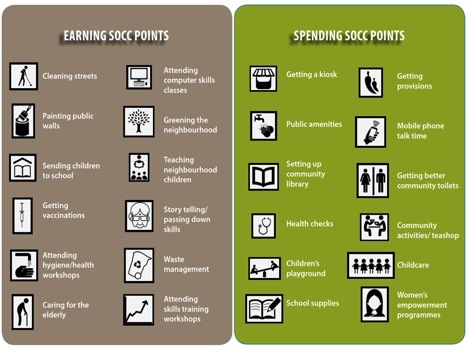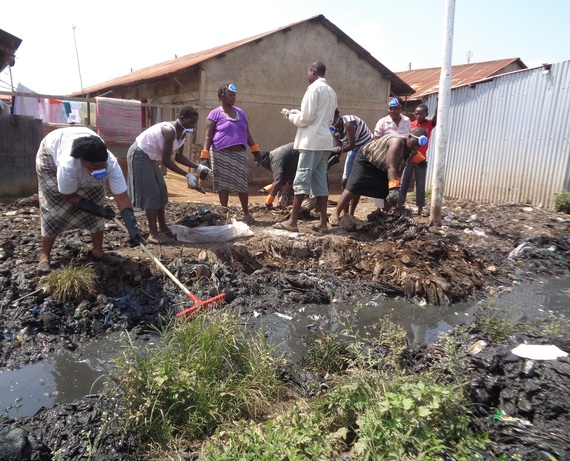Everyone thinking about sustainable development understands by now that women's economic empowerment is key to global progress, with heightened incomes spent directly on improving family health, nutrition and education that can pave the way to better jobs and integration into the formal economy.
The question, though, is how to make such economic empowerment real, ubiquitous and sustainable. At WomenStrong International, we work through women's savings groups which practice time-tested micro-finance strategies that increase women's earnings, enabling them to pay a daughter's school fees, purchase health and life insurance, or start up or expand small businesses.
We have integrated mobile deposits into our programs and forged partnerships with financial institutions that make it possible for women to open bank accounts, paving the way for fuller inclusion in the economic life of their countries.
On their own, however, savings programs cannot finish the job.
An additional path toward economic empowerment is the ingenious system of Social Capital Credits, or SoCCs. This "community currency for social good" was developed by Columbia University professor Geeta Mehta and her non-profit organization Asia Initiatives. Adopted in concert with savings programs, financial literacy training and mentoring, SoCCs work to help groups of women see, often for the first time, the value of their unpaid labor. SoCCs demonstrate that, individually and together, they can improve their communities and so the circumstances of their families.
Working in groups, women or girls choose what they will do to earn Social Capital Credits and how they will spend their earned points. Their unpaid work - "reproductive labor" in feminist terminology, "community service" in current American parlance - is accorded a precise and remunerable value that can be redeemed for desired goods and services selected by the women and compiled in "Spending Menus."
Examples of the benefit of SoCCs abound: in Manyatta, the largest slum in Kisumu, Kenya, one women's savings group organized by WomenStrong Consortium member Alice Visionary Foundation Project earned SoCCs by clearing the vacant and neglected properties of area landlords. These landlords were so impressed by the work completed that they agreed to allow the women to plant community gardens on the newly cleared land. The harvested fruits and vegetables now produce enough both to feed the new gardeners' families and surplus to be sold for cash. The women have invested profits from the sales in new small enterprises and kitchen gardens, the income and results of which all redound to their families' benefit.
In Kumasi, Ghana, market women working with WomenStrong Consortium member Women's Health to Wealth (WHW) also opted to earn SoCCs by participating in a community clean-up. Here, they chose to barter their credits for materials to pave their market alleyways, so that in rainy season they're not wading through deep mud. The women also included on the SoCCs "Earning Menu" the action of supporting their daughters' perfect school attendance and encouraging their daughters to not become pregnant.
Our Kumasi-area Girls' Clubs have formed their own SoCCs groups and created their own SoCCs menus: in exchange for good attendance and not getting pregnant, these at-risk junior and senior high schoolers earn treats and outings. They also can earn citrus and mango trees to plant, helping address the rampant anemia and vitamin deficiencies among adolescent girls in Kumasi. The district school superintendents have been so impressed with these girls' health and performance that they have asked WomenStrong/WHW to double the number of Girls' Clubs per district, which we have done.
Here at home, WomenStrong DC participants have selected specific projects through which they plan to earn SoCCs. One involves feeding the homeless. With many of the women having once been homeless themselves, they say they know exactly what the homeless need and are now mobilizing to procure, prepare and deliver meals that they know will be most appreciated. In this case, the women's own hardship has become an asset in preparing to earn SoCCs by easing others' experience of homelessness.
Income-generating programs are rightly a hot topic in international development circles, with direct cash transfers now often saluted as the solution to extreme poverty. The line of thinking goes, just give the poor money and they'll know best what they need, all else is paternalism, even vestigial colonialism, at work. It's true that poor people, like most people, know best what they need, but they lack the financial and technical resources to get there. Cash transfers can work brilliantly when accompanied by skills training and mentoring in how best to invest the funds provided to fulfill a person's plans and dreams. Without such training and mentoring, success is less sure. Building a small business or a child's healthful nutrition and education require thoughtful budgeting and planning; a woman starting from far behind needs and welcomes the knowledge that can enable her to achieve her goals and avoid discouraging mistakes.
Social Capital Credits are a powerful new addition to the income-generation toolkit. Working together, groups of women and girls in our Asian, African, Caribbean and American settings have demonstrated an impressive motivation to earn things well beyond their financial reach by performing acts of unquestionable value to their communities that benefit their families directly and through SoCCs rewards - a second table for their market stall, chicks to start a poultry business, even a child's school fees. Who knows? This ingenious concept once it spreads might even, one day, compel financial markets to reassess the actual value of "women's work."


